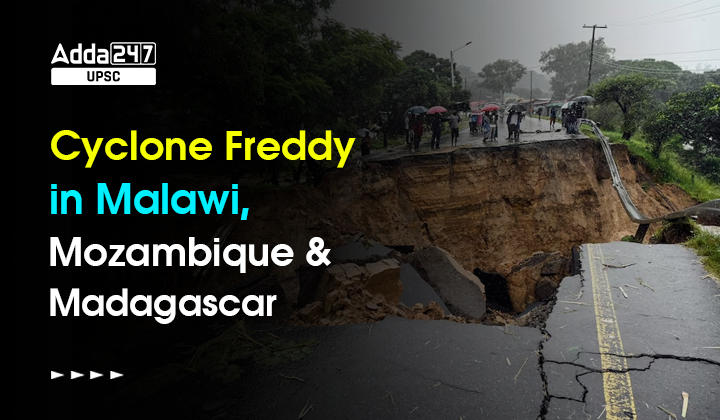Table of Contents
Cyclone Freddy: it is a tropical cyclone which has recently caused serious damage in south Africa region in terms of destruction of property and human lives. Cyclone Freddy is also important for UPSC Prelims 2023 and UPSC Mains Exam (GS Paper 1- Various geographical phenomenon like Cyclones, Earthquakes, etc.; GS paper 3- Disaster and Disaster Management).
Cyclone Freddy in News
Recently, the Indian Prime Minister, Shri Narendra Modi expressed deep grief over the loss of lives due to Cyclone Freddy in Malawi, Mozambique and Madagascar. Hundreds of people have been killed due to destructions caused by the cyclone Freddy. The U.N.’s meteorological center on the island of Réunion projected that Freddy Cyclone will continue to thump central Mozambique and southern Malawi with extreme rainfall before it exits back to the sea late Wednesday afternoon.
Cyclone Freddy
Cyclone Freddy is set to be the longest-ever recorded tropical cyclone as it was first developed near Australia in early February 2023 and expected to continue for few more days. An expert panel has been convened by the U.N.’s weather agency to determine whether Cyclone Freddy has broken the record set by Hurricane John in 1994 of 31 days.
- Since late February, Cyclone Freddy has been wreaking havoc in southern Africa, while also hitting Madagascar and Réunion in the Indian Ocean last month.
- Remarkably, the cyclone has undergone a record seven intensifications and boasts the highest-ever recorded accumulated cyclone energy (ACE), which gauges the energy released by a cyclone throughout its life.
- In fact, Freddy discharged more energy in its lifespan than an entire typical U.S. hurricane season.
Impact of Cyclones
Cyclone Freddy is the latest in a series of natural disasters that have hit the world in recent years, including cyclones, floods, and droughts.
- As climate change continues to disrupt global weather patterns, it is becoming increasingly important for governments and communities to prepare for the impacts of extreme weather events like frequent cyclones.
- One of the biggest challenges in dealing with cyclones is the sheer scale of their impact.
- Cyclones can cause extensive damage to infrastructure, homes, and businesses, as well as disrupt transportation networks and essential services like power and water supply.
- The high winds and heavy rain associated with cyclones can also lead to flooding and landslides, posing a significant risk to human life.
Way Forward
To minimize the impact of cyclones, it is crucial to have effective preparedness plans in place. This involves both short-term emergency response measures and longer-term measures to build resilience in vulnerable communities. Some of the key steps that can be taken to prepare for cyclones include:
- Developing early warning systems: This involves the use of weather forecasting and monitoring systems to detect the formation and movement of cyclones. Early warning systems can help to alert communities to the potential risks and give them time to prepare.
- Evacuation planning: In the event of a cyclone, it may be necessary to evacuate people from the affected areas. This requires detailed planning, including the identification of safe evacuation routes and the provision of temporary shelter and supplies.
- Strengthening infrastructure: Infrastructure like buildings, roads, and bridges can be reinforced to withstand the high winds and heavy rain associated with cyclones. This can include measures like retrofitting buildings with stronger materials, improving drainage systems, and reinforcing critical infrastructure like power lines and communication networks.
- Building community resilience: It is also essential to build the resilience of communities to the impacts of cyclones. This can involve measures like providing training on disaster preparedness, establishing community-based early warning systems, and promoting sustainable agriculture practices that can help to reduce the risk of crop damage and food shortages.
Conclusion
Cyclones like Freddy represent a significant threat to human life and infrastructure, particularly in vulnerable communities. To minimize the impact of cyclones, it is essential to have effective preparedness plans in place that can help to reduce the risk of damage and loss of life. This requires a coordinated effort from governments, communities, and international organizations to ensure that vulnerable communities have the resources and support they need to withstand the impacts of extreme weather events.
Cyclone Freddy FAQs
Q1. What is Cyclone Freddy?
Ans: Cyclone Freddy is a tropical cyclone that formed in the Indian Ocean in late February 2023.
Q2. Where has Cyclone Freddy impacted?
Ans: Cyclone Freddy has impacted southern Africa, including Mozambique, Zimbabwe, and Malawi, as well as the island states of Madagascar and Réunion.
Q3. What kind of damage has Cyclone Freddy caused?
Ans: Cyclone Freddy has caused extensive damage, including flooding, landslides, infrastructure damage, and displacement of individuals. Fatalities have also occurred.
Q4. What makes Cyclone Freddy unusual?
Ans: Cyclone Freddy is unusual due to its high accumulated cyclone energy (ACE), which measures the total energy released by a cyclone over its lifetime. Freddy has the highest-ever recorded ACE, and has undergone a record seven intensifications.
Cyclone Gulab- Key Features and Naming of Cyclones



 TSPSC Group 1 Question Paper 2024, Downl...
TSPSC Group 1 Question Paper 2024, Downl...
 TSPSC Group 1 Answer key 2024 Out, Downl...
TSPSC Group 1 Answer key 2024 Out, Downl...
 UPSC Prelims 2024 Question Paper, Downlo...
UPSC Prelims 2024 Question Paper, Downlo...
